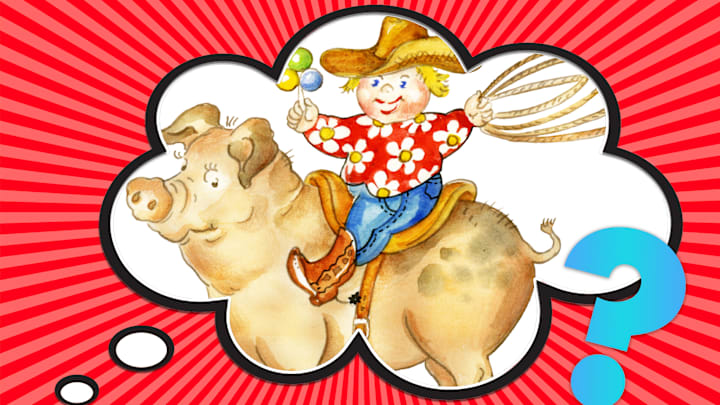With the exception of certain fearless farm children who have tried it, hitching a ride on the back of a pig isn’t really a thing. And even if it was, the position would hardly look like what we call a “piggyback ride.” Humans walk on two feet; pigs, needless to say, stick to four.
So where did the term piggyback ride come from?
Piggyback Origins
As Michael Quinion explained on his World Wide Words blog, it came from a 16th-century phrase that merely implies that someone’s back is involved and has nothing to do with pigs at all: pick pack. Back then, the word pick could also mean “pitch,” so the leading theory is that pick pack originally referred to a pack pitched on your back for ease of transport. After a while, people started using it to describe other things—including people—carried on your back.
Though the evolution of pick pack to piggyback isn’t exactly a straight (or even solid) line, what we do know is that somewhere along the way, pack got changed to back. This is likely because pack was so easy to mishear as back, especially considering that a back was so integral to every pick pack operation.
The pick-to-pig update is also thought to have occurred simply because the words sound so similar. And it happened quite a while ago: According to the Oxford English Dictionary, the earliest written mention of pig back dates all the way back to 1736.
As for how pig became piggy, that, too, can probably be chalked up to miscommunication. Pick pack, pick back, and pig back spawned pick-a-pack, pick-a-back, and pig-a-back—the last of which seems to have been mistaken often enough for piggyback that it eventually stuck, which happened around the mid-19th century.
And if “Pick sounds like pig” just doesn’t seem adequate to explain how swine got swapped into the phrase, A Dialogue in the Devonshire Dialect, published in 1837, offers a different one. In its glossary, the term pig-a-back is defined as being “said of schoolboys that ride on one another’s backs, straddling, as an Irishman would carry a pig.” So while piggyback rides never really referred to people riding on pigs, some of them may have involved pigs riding on people.
Additional Meanings of Piggyback
Since its creation, piggyback has taken on meaning beyond “carrying a person on one’s back.” It’s been used to describe the act of putting one thing on top of another (transporting a space shuttle on a rocket bound for space, for example); or, if you’re a semi-truck driver, it could refer to one semi hauling several other semis.
Starting in the 1960s, piggyback could also mean “To support (a person, project, etc.); to give aid or assistance,” according to the OED. You may have also heard it in a business context, when a colleague says they’re going to “piggyback off” something their coworker has already said. It quickly joined the ranks of most-hated corporate buzzwords—so avoid the low-hanging fruit and give 110 percent in thinking outside the box to come up with an alternative.
Read More Articles About Phrase Origins:
A version of this story ran in 2022; it has been updated for 2024.
